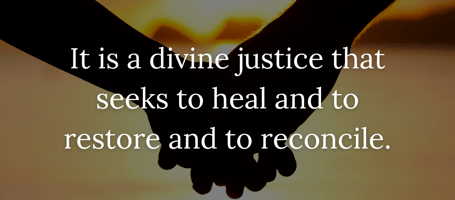This blog is based on a sermon by Pastor Teresa Howell-Smith on January 26, 2025 I recently came...
Blessed Are Those Who Walk Softly and In a Humble Manner

This blog is based on a guest sermon given Feb. 18 by Sheila Feay-Shaw.
I am not a Biblical scholar, so when Pastor Teresa recently asked me to preach today, and I knew we would be in the series on the Beatitudes, I had some research to do. I asked if I could have Matthew 5:5 — “Blessed are the meek for they shall inherit the earth” — because it was the Beatitude that is most often ascribed to the Native American people.
The Sermon on the Mount was Jesus’ way of laying out His teachings for the disciples and his other followers. These teachings helped to define the followers of Christ as a community set apart from others to bear witness to the light of God’s truth. Where God had given teachings to Moses on another mountain which laid down the holy laws and judgment for breaking them, Jesus gave the people his teachings which were grounded in his experiences on earth, offering himself as a means of bearing witness to God’s love. It has been said that only those who have rested in Christ and moved forth in works have any hope of living up to these teachings. I was raised with my father’s ministry among the Menominee people, which gave me a broader vision of God and the works of a Christ through which to live out these teachings.
Richard Twiss, Taoyate Ob Najin, “He Stands with His People,” was Rosebud and Oglala Lakota. In his book Rescuing the Gospel from the Cowboys, he wrote, “Stories are people, people are their stories, and stories are alive. Traditionally, Native American stories are never fully explained. The power and influence of the story does not lie in the exact correctness of the telling, but in the life of the ‘teller’.”
If you think about many of the parables that Jesus (the teller of important stories) told in the Bible, they are not fully explained teachings, but rather experiences being told through the lives of various people. According to Matthew, Jesus spoke in parables because those who did not believe were not able to see, hear and understand the meaning of his teachings but those who were willing to listen and thoughtfully consider what he said would be granted understanding. I pray that what I have to share this morning will be something that you can hear as my understanding of stories of our relationship in Christ with our indigenous brothers and sisters.
Dictionary.com gives a modern definition of meek as “docile, overly compliant, spiritless, yielding or tame.” This modern way of looking at the identity in today’s scripture would carry a negative connotation for those of whom we are speaking. Other scriptures describe the downtrodden, desperate, poor or needy as those who need to be cared for by those who are blessed with wealth. This is closer to the Hebrew word for meek, anaw, which is someone who is afflicted or willing to endure a heavy burden rather than succumb to it. But the original Greek word was praeis, meaning gentleness and humility, an inward quality which manifests itself outwardly. The word comes from the military practice of bringing a wild horse under the control of a specific rider while still allowing the horse to maintain power and strength that can be called upon when needed. The horse succumbs to the will of the rider to become gentle but without giving up their spirit. These definitions of who Christ was referring to as “the meek” have strong relationships to our history with the indigenous people of Turtle Island.
In 1620, the Mayflower arrived on the shores of what we know as Massachusetts to establish settlements on territory of the Wampanoag nation. The Wampanoags kept watch the first winter, and almost half of the new settlers died from cold, disease and starvation. In the spring, a Wampanoag chief reached out to offer help out of a sense of wanting to keep peace in the region, recognizing that this new encounter with Europeans would likely be different from what had come before. The hospitality and support which the Wampanoag offered to the settlers, hoping to ally themselves, became the first steps to being pushed off their land and forced to convert to Christianity. The Wampanoag offered the Greek perspective on meekness, and were strangled with the Hebrew outcome of a heavy burden which is retold as a tale of mourning each year at Thanksgiving.
In the same way, the boarding school experience took children away from their families and forbade them to speak the language of their world, which was so much more than a way to communicate with each other. Embedded in the language were the stories of who and whose they were, and how they were to live. In Anishinaabemowin, the word is mino-bimaadizi, which means to live a good life. It is more than saying you are physically well, it means that you are doing your best to live out the seven Grandfather teachings. In a similar way to how we pass down Biblical stories from elders to children, the Grandfather teachings are stories shared from the time a child is born, explaining actions of what to do in life to live in relationship to self and others. Elders have confirmed that the origin of the various teachings is unknown. As with the Beatitudes of Jesus, the overall message is that through living well, life will continue to improve. The concepts described in these stories take on multiple forms as ideas, actions, and nouns:
- Zaagi, or love, is represented as the connection that exists between two people and our action of showing love to someone else.
- Debwe, or truth, is both the correctness of statements made but also being aligned or centered in yourself.
- Minwendaagwad is respect, meaning thinking and speaking good thoughts and being worthy.
- Apiitendaagwad, or bravery, is having an intense or strong heart.
- Nibwaakaa is wisdom, to speak wisely, to have good judgment and to learn from the wiseness of others.
- Miigwe’aadizi, or generosity, is a gift, to embody giving, or to be compassionate and creative for others.
- Finally, dabasenindizo, or humility, is to be modest and put yourself lower than others.
These were and still are the traditional teachings through which many Native Americans frame the world. In historical times, when government officials were invited to talks with the chiefs and warriors of a Nation, the Native people assumed that these same principles would be guiding the white man’s interactions. When the government officials were welcomed into a tipi or wigwam, they were given the seat of honor to show respect for the fact that they represented the Great White Father, their name for the President of the United States. Instead of being shown truth, generosity, and humility in return, and having the wisdom of their ways respected, we labeled them savages, broke the treaties we made with them, and took away their land, their traditions, and their culture.
Chief Joseph of the Nez Pierce nation, who refused to leave his land in the Pacific Northwest, stated: “All men were made by the same Great Spirit Chief. They are all brothers. The earth is the mother of all people, and all people should have equal rights upon it. You might as well expect all rivers to run backward as that any man who was born a free man should be contented when penned up and denied liberty to go where he pleases. Whenever the white man treats the Indian as they treat each other then we shall have no more wars. We shall be all alike — brothers of one father and mother, with one sky above us and one country around us and one government for all. Then the Great Spirit Chief who rules above will smile upon this land and send rain to wash out the bloody spots made by brothers’ hands upon the face of the earth. For this time, the Indian race is waiting and praying. I hope no more groans of wounded men and women will ever go to the ear of the Great Spirit Chief above, and that all people may be one people.”
In recent years, our nation has begun to recognize the wisdom of indigenous people as it relates to our care of Mother Earth in particular. We have started to acknowledge the power and strength of understanding that has been resting, waiting to be called upon to serve the Great Creator Chief. Efforts by Native nations to restore animals to their original habitats to help balance the predator-prey relationships have addressed diseases which have developed through population growth. The reestablishment of habitats, both on land and in water, for species sacred to Native people have brought back traditional practices which are serving to provide food and cultural relationships that have been denied for centuries. Cultural burns are being adopted by Federal and state agencies, an ancient practice of the Karuk, Hupa, and Yurok in Northern California, where prescribed or controlled burns are ignited and tended as a way to maintain the health of the forest to prevent larger fires. The recognition of the indigenous earthworks mounds in Ohio as a World Heritage site by UNESCO acknowledges the mathematical wonder of building that was completed by Indigenous scholars 1,600 to 2,000 years ago.
The First Nations Version of the New Testament frames the Beatitudes as the “Blessings of the Good Road.” I’d like to close with this version of the Beatitudes and ask you to hear how the language does not just offer gifts to the blessed because of who they are, but because of what they do:
First Nations Beatitudes
Creator’s blessing rests on the poor, the ones with broken spirits. The good road from above is theirs to walk.
Creator’s blessing rests on the ones who walk a trail of tears, for he will wipe the tears from their eyes and comfort them.
Creator’s blessing rests on the ones who walk softly and in a humble manner. The earth, land, and sky will welcome them and always be their home.
Creator’s blessing rests on the ones who hunger and thirst for wrongs to be made right again. They will eat and drink until they are full.
Creator’s blessing rests on the ones who are merciful and kind to others. Their kindness will find its way back to them—full circle.
Creator’s blessing rests on the pure of heart. They are the ones who will see the Great Spirit.
Creator’s blessing rests on the ones who make peace. It will be said of them, ‘They are the children of the Great Spirit!’
Creator’s blessing rests on the ones who are hunted down and mistreated for doing what is right, for they are walking the good road from above. Others will lie about you, speak against you, and look down on you with scorn and contempt, all because you walk the road with me. This is a sign that Creator’s blessing is resting on you. So let your hearts be glad and jump for joy, for you will be honored in the spiritworld above. You are like the prophets of old, who were treated in the same way by your ancestors.
May the Great Spirit Chief bless our understanding of these words, and move us to action in the ways that lead to relationships of peace and justice across this land.





